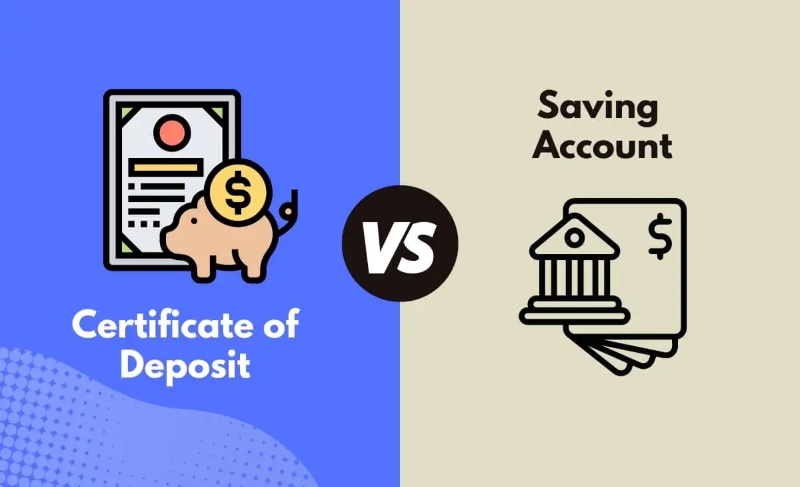What is a certificate of deposit? This is a popular financial product, bringing many benefits to depositors and has its own characteristics compared to a savings book.
Certificates of Deposit: Important Information You Need to Know
Certificate of Deposit (CD) is a popular financial product issued by banks, allowing depositors to receive a fixed interest rate when committing to deposit a sum of money for a specific period of time. This is a suitable investment solution for those who desire stability and avoid risks from volatile investment channels.
What is a Certificate of Deposit?
A certificate of deposit is a special type of savings account in which the depositor agrees to keep the money in the bank for a fixed period of time, which can range from a few months to a few years. During this time, the depositor cannot withdraw the money, but in return, they will receive a higher interest rate than a regular savings account.

The strength of a certificate of deposit lies in its stability and low risk. This product is suitable for those who seek security and want a fixed source of income, not affected by financial fluctuations such as stocks or real estate.
Safety When Investing in Certificates of Deposit
Are certificates of deposit safe? Certificates of deposit are considered one of the safest investment channels today. In Vietnam, deposits are usually protected by the Deposit Insurance of Vietnam (DIV), while in the US, the FDIC is responsible for insuring depositors in case of bank failure.

However, certificates of deposit are not completely immune to all risks. One major challenge that investors need to be aware of is inflation. If the fixed interest rate of a certificate of deposit is lower than the inflation rate, the real value of the money at maturity may decrease. Therefore, it is necessary to consider choosing a product with a high interest rate during an inflationary period. When deciding to invest, in addition to certificates of deposit, many people also consider other investment channels such as gold and real estate.
Certificate of Deposit vs. Savings Book: What's the Difference?
Although both products are offered by banks, certificates of deposit and savings books have distinct differences, so What is the difference between a certificate of deposit and a savings book?:

- Withdrawal period: A savings account allows the depositor to withdraw money at any time without penalty. Meanwhile, a certificate of deposit requires the deposit to be held for a specific period of time.
- Interest rate: Typically, interest rates on certificates of deposit are higher than savings accounts due to the long-term commitment to deposit.
- Withdrawal method: If you want to withdraw your money before maturity, you will usually have to pay a penalty fee or lose some of the interest. This is why this product is more suitable for people with a stable financial plan.
Certificate of Deposit Market and Its Fluctuations
Interest rates on certificates of deposit are constantly changing to suit market conditions and customer needs. In the context of high inflation, many banks have launched deposit certificate programs with competitive interest rates to attract deposits from customers and bank bonds. Therefore, investors should regularly update news about certificates of deposit to have investment plans that are suitable for you.
Smaller banks tend to offer more attractive interest rates than larger institutions to increase their competitiveness. Monitoring and updating interest rate information from reputable sources is essential to choosing the right product for your personal financial goals.
Choosing Banks with the Best Interest Rates
One of the important factors when choosing a certificate of deposit is the interest rate, so Which bank certificate of deposit is the highest?
Large banks such as Vietcombank, Techcombank, and BIDV often launch incentive programs for certificates of deposit with competitive interest rates. However, many small banks are no less attractive when providing products with more attractive interest rates.
In addition to the interest rate, you should also consider other terms, such as minimum deposit amounts, early withdrawal penalties, or accompanying incentives. These factors can affect the actual benefit you receive from investing.
Transferability of Certificate of Deposit
A prominent feature of certificates of deposit is transferability. In case the owner does not want to continue holding the certificate, he can transfer it to a third party. This brings greater flexibility to the product.
However, transfers often depend on the regulations of each bank. Some banks require the transferor to pay fees or comply with specific conditions. Therefore, you should carefully study the regulations before making the transaction.
Certificate of Deposit: A Safe and Effective Investment Solution
Certificates of Deposit (CD) are currently attracting great attention from investors thanks to their safety and stable profitability. This is a financial product suitable for those who want to preserve capital and receive fixed profits. So what are the benefits and limitations when choosing a certificate of deposit?

Outstanding Benefits of Certificate of Deposit
1. Preferential Interest Rate Higher Than Other Products
Certificates of deposit are designed with much more attractive interest rates than regular savings accounts. These interest rates often increase according to the term of the deposit and the value of the deposit, creating significant profits for investors, especially when depositing for a long term of one year or more.
In the context of deep savings interest rates, this is an effective channel to optimize idle capital. If you do not need to use the money in the short term, certificate of deposit is The ideal solution to ensure stable profits.
2. Capital Preservation and Asset Protection
With protection from deposit insurance agencies such as the Deposit Insurance of Vietnam (DIV), certificate deposits are guaranteed to be safe, even when the issuer encounters financial risks. In Vietnam, the amount insured is up to the maximum level as prescribed, helping investors feel more secure when depositing money.
This security is especially important during times of economic uncertainty. Investing in a certificate of deposit not only provides a sense of security, but also helps maintain the value of your assets over the long term.
3. Effective Management Through Digital Technology
Thanks to the development of electronic banking, managing certificates of deposit has become easier than ever. Banking applications now allow customers to track interest rates, terms and important information without having to go directly to the transaction counter.
Additionally, users receive automatic notifications about important milestones such as due dates, which helps them be more proactive in adjusting their personal financial plans.
4. Flexibility in Transfer Operations
Another advantage of a certificate of deposit is transferability. The owner can resell the certificate to someone else if he needs urgent capital or wants to restructure his investment portfolio.
However, it is important to note that not all banks have flexible transfer policies, and there may be additional costs or specific requirements. Therefore, it is important to understand the terms before investing.
5. Support Long-Term Investment Plan
A certificate of deposit helps you develop a more disciplined and clear financial strategy. Deciding to deposit money for a fixed term means that you have clearly defined your goals and are committed to following that plan. This is an important first step to achieving your future financial goals.
Limitations to Note When Investing in Certificates of Deposit

1. Liquidity Limitationsn
One of the major drawbacks of CDs is their low liquidity. During the term of the deposit, if you want to withdraw your funds before the maturity date, you may be subject to a significant penalty. This can be inconvenient in emergencies, such as medical expenses or major repairs.
Therefore, if you need a flexible investment channel, products such as investment funds or savings accounts may be more suitable.
2. Fixed Interest Rate – Limits Growth Potential
Once you choose a certificate of deposit, the interest rate is fixed and will not change throughout the term. This means that if the interest rate market rises sharply, you will not benefit from that growth.
For example, in case the market interest rate increases from 3% to 5% during the period you deposit the certificate, your investment will become less attractive compared to new products.
3. Risks From Inflation
The fixed interest rate on a certificate of deposit may not be enough to offset the impact of inflation. When inflation is higher than the interest rate received, the real value of your investment will decrease.
This requires investors to consider carefully, especially in the context of high inflation as it is now.
Conclude
Certificate of deposit is a safe, stable investment tool suitable for those who want to optimize their capital without taking on great risks. Although there are some limitations such as inflation risk or the requirement to keep money for a long time, this product still brings many benefits with high interest rates and flexible transferability.
To maximize investment efficiency, HVA Group We recommend that you consider factors such as interest rates, terms, and market trends before making a decision. Researching and staying informed from reliable sources will help you make informed choices that fit your financial plan.











